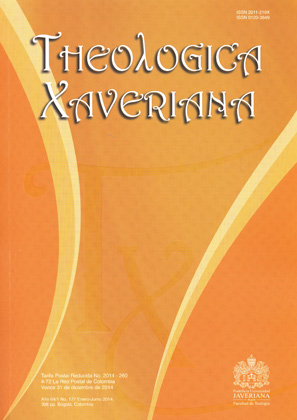Abstract
The concept of the “historical Jesus” is the starting point for Latin American Christological reflection; it can be considered the “gateway” to Latin American Christology as seen from the new theological-ecclesiastic perspective proposed by the Second Vatican Council. Following the path built by Liberation Theology, Christology appropriates the new vision of the world, of history, of humanity and salvation suggested by the Church in the conciliar documents. Jesus of Nazareth, the historical Jesus, clearly represents not only the influence but also the creative application in Latin American Christology of some of the various theological changes proposed by the Vatican Council.
This journal is registered under a Creative Commons Attribution 4.0 International Public License. Thus, this work may be reproduced, distributed, and publicly shared in digital format, as long as the names of the authors and Pontificia Universidad Javeriana are acknowledged. Others are allowed to quote, adapt, transform, auto-archive, republish, and create based on this material, for any purpose (even commercial ones), provided the authorship is duly acknowledged, a link to the original work is provided, and it is specified if changes have been made. Pontificia Universidad Javeriana does not hold the rights of published works and the authors are solely responsible for the contents of their works; they keep the moral, intellectual, privacy, and publicity rights.
Approving the intervention of the work (review, copy-editing, translation, layout) and the following outreach, are granted through an use license and not through an assignment of rights. This means the journal and Pontificia Universidad Javeriana cannot be held responsible for any ethical malpractice by the authors. As a consequence of the protection granted by the use license, the journal is not required to publish recantations or modify information already published, unless the errata stems from the editorial management process. Publishing contents in this journal does not generate royalties for contributors.


